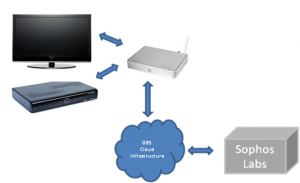SW tech drives Amazon’s Internet of Things operating system for billions of devices
Amazon has tapped SouthWest technology for the embedded software to control billions of devices in the Internet of Things (IoT).
The company has launched its own version of the world’s most popular embedded operating system, FreeRTOS, developed in Bristol by Richard Barry who worked for Wittenstein High Integrity Systems (WHIS).
Last year Barry joined Amazon as a principal engineer and, as a result, the FreeRTOS kernel version 10 is now under the MIT licence – allowing it to be used freely (instead of its previous and more restrictive GPLv2 licence).
Simplified licensing has long been requested by the FreeRTOS community and the choice of the MIT licence was based on the needs of the embedded systems community. Open source Amazon has also developed its own version, Amazon FreeRTOS, which is based on the FreeRTOS kernel and adds support for Amazon Web Service (AWS) and IoT use cases. This includes software libraries that make it easy to securely connect devices to the cloud and on a local network. This works on boards developed by STMicroelectronics which also had a large embedded technology centre in the region for many years.
You can find out much more at Amazon taps Bristol tech for Internet of Things operating system -TechSPARK.co
Bristol software firm develops first anti-virus protection for TVs
Televisions are increasingly becoming ‘smart’ and connecting to the Internet, but protecting your TV against threats such as malware and viruses has been lacking. Ocean Blue software, a Bristol-based TV software developer that works with TV and set top box makers around the world has developed the first anti-virus protection for your TV using cloud technology.
It has partnered with IT security leader Sophos to develop a cloud-based antivirus solution that can be shipped either as part of the Ocean Blue middleware or as a stand-alone client for solutions with their own middleware.
According to Futuresource Consulting, by 2015 over 80 percent of new televisions and set-top boxes will be Internet-ready. As many of these products will be based on either Linux or Android, they will be capable of downloading and running remote applications. While this connectivity brings many new features, it also exposes these devices to potential viruses and other malware, making antivirus protection essential.
The new Ocean Blue software was a joint effort based on the combined forces of SophosLabs advanced antivirus expertise and the category-leading Ocean Blue Software Television and Set top Box middleware. The end result protects against the maximum number of threats, with the lowest demand on system resources.
“Almost all new connected TV products are at risk from malware” says Ken Helps, founder and CEO of Ocean Blue Software. “This partnership with Sophos will allow us to provide manufacturers with middleware already prepared to defend their products against attack.”
“Most consumers don’t realize that Smart TVs are just as vulnerable to threats as other devices,” said Michael Rogers, Vice president, global alliances and OEM at Sophos. “This partnership with Ocean Blue Software provides tremendous opportunity to allow consumers to take advantage of the features Smart TVs offer, while ensuring their home networks remain secure.”
Related articles
Cabinet Office Approves Bristol’s Open Source Plans
Bristol City Council has been given the green light to push ahead with its open source strategy following a meeting with CESG, the cyber security arm of the UK intelligence services.
The move is a key step in stimulating innovation in software for government systems.
via Cabinet Office Approves Bristol’s Open Source Plans | eWEEK Europe UK.
Related articles
- Cabinet Office shuns open-source in IT-tracking deal (go.theregister.com)
- UK cyber security plan delayed till October (go.theregister.com)
The Big M review – Future innovations in mobile technology
Over 200 mobile professionals and developers gathered in Bath for the Big M conference on Monday, looking at a range of key issues for the mobile industry.
David Simpson has written a great review here: http://davidsimpson.me/2011/03/23/the-big-m-conference-bath/ and highlights Paul Golding’s presentation on future innovations.
Paul, the lead Innovation Architect and CEO of Wireless Wanders in Swindon, is a great example of the strength of the region – he has been on the leading edge of the mobile industry for 20 years, defining, designing and implementing many new products and services. He is the inventor of the first ever mobile internet portal (Zingo), designed for Lucent Technologies in 1997 and developed further for NTT DoCoMo in 1998. He was recently consulting as Motorola‘s Chief Applcations Architect and now resides at O2 as a founder member of “The Lab,” which is an “intrapreneurial” venture to exploit new business opportunities using Web start-up methodologies. He also founded the O2 Incubator. He is also a mentor in the Springboard Incubator program.
His presentation from the Big M is here and well worth a read: http://www.slideshare.net/pgolding/big-m-conference-future-mobile-innovations
Related articles
- Motorola Mobility Announces Intent to Acquire Dreampark (prnewswire.com)
- Future of innovation: Readers’ predictions about mobile gadgets. (slate.com)
Nationwide laboratory software for undergraduates for trial by Christmas
Bristol ChemLabS hopes to have trial versions of laboratory skills software for biological science undergraduates ready by Christmas. The software will follow the successful model of undergraduate and A-Level chemistry software developed by Bristol ChemLabS and its Bristol-based software partner Learning Sciences Ltd. See the full story by Sian Harris of SWinnovation News.
Related articles
- £1.5million medical exhibition opens in Bristol (swinnovation.co.uk)








